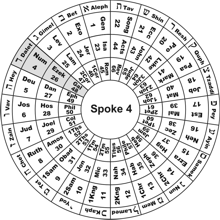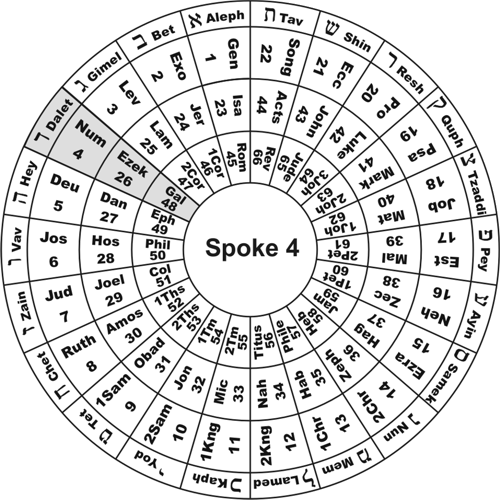Spoke 4 - Dalet - A Covenant of Peace
Wherefore say, Behold, I give unto him my covenant of peace:
And he shall have it, and his seed after him, even the covenant of an everlasting priesthood;
because he was zealous for his God, and made an atonement for the children of Israel.
Numbers 25.12
Moreover I will make a covenant of peace with them; it shall be an
everlasting covenant with them: and I will place them, and multiply them, and will set my
sanctuary in the midst of them for evermore. My tabernacle also shall be with them: yea,
I will be their God, and they shall be my people.
Ezekiel 37.26
Peace with God is the great promise of the Holy Gospel. We find its origin in the Fourth Commandment
(Sabbath Rest) which is fulfilled in the death of the Lord Jesus Christ whereby
"made peace through the blood of his cross." We have here an extremely deep relation between the
Cross (essence of 4, and instrument of Death), the Fourth Commandment, the
Fourth Seal (Death), Psalm 4,
and the idea of Blood which makes its debut in Genesis 4
(implicitly in the Abel's sacrifice and explicitly in Cain's murder of Abel.)
Oh! What a surging sea of sin in which we live! Give thanks to the
Lord for His everlasting Covenant of Peace!
Yet there is more. Searching the entire KJV for all occurrences of the phrase
("covenant of peace") [Verify] yields
exactly three verses: the two quoted above, and this one from Ezekiel 34.24:
And I the LORD will be their God, and my servant David a prince among them;
I the LORD have spoken it. And I will make with them a covenant of peace,
and will cause the evil beasts to cease out of the land: and they shall dwell
safely in the wilderness, and sleep in the woods.
This means we have a double KeyLink between Numbers and Ezekiel where the phrase occurs twice:
 | KeyLink: A Covenant of Peace | Numbers Ezekiel Ezekiel |
As an aside, it should also be noted that the set (peace, dwell, safe*) [Verify] forms a KeyLink between
Ezekiel 34.35 and Psalm 4.
God sealed the Covenant of Peace through the death of the Lamb of God, prophesied in Daniel 9.26:
And after threescore and two weeks shall Messiah be cut off, but not for
himself: and the people of the prince that shall come shall destroy the city and the sanctuary;
and the end thereof shall be with a flood, and unto the end of the war desolations are determined.
We have the identity:
| Covenant of Peace

B'rit Shalom |
|
= 988 = |
| Messiah shall be cut off

Yikrat Meshiah |
|
This is the everlasting Gospel, eternally encoded by God in the intrinsic alphanumeric structure of
the Greek and Hebrew languages and engraved in the geometric structure of His Holy Word! Endless Glory!
In the KJV, the exact phrase ("covenant of peace") [Verify] appears only in Numbers and Ezekiel,
thereby forming
a true Spoke 4 KeyLink between Cycle 1 and Cycle 2. In most other versions,
we also find the phrase in one other verse, Isaiah 54.10:
For the mountains shall depart, and the hills be removed; but my kindness shall not
depart from thee, neither shall the covenant of my peace be removed, saith the LORD that hath mercy on thee.
As is clear, there is a strong thematic link with this verse also, though it is not geometrically integrated
with the verses from Numbers and Ezekiel (Spoke 4) since neither
Isaiah (Spoke 1 of the Bible Wheel) nor Isaiah 54 (Spoke 10 of the Inner Wheel of Isaiah) align with
Spoke 4. This made me curious why the KJV has a true KeyLink based on the phrase "covenant of peace."
What caused this apparently small and insignificant variation?
There are three closely related phrases translated variously as "covenant of peace,"
"my covenant of peace" and "covenant of my peace:"

The variations are due to the Yod (Hand) suffixed to B'rit and Shalom, which signifies
personal possession (possession represented by the hand that grasps).
The KJV has the true KeyLink because the translators were very literal and translated B'Rit Shlomi exactly as
you would read it: the covenant of my peace. This small difference may or may not
have much significance, I
don't know. But what I do know is that this one tiny change results in a true KeyLink only in the KJV
and NKJV. It is also intriguing that the variation based on Yod - the unique biblical reference
to "the covenant of my peace" - appears on
Spoke 10 of the Inner Wheel of Isaiah governed by Yod and corresponding to Book 54
(I Timothy).
All versions have a strong thematic link between Numbers and Ezekiel because this is
based on the content of the original text, independent of translation. But there is a
certain beauty in seeing the many true KeyLinks that are particularly prevalent in the KJV.
We can overcome these translational variations and reveal the KeyLink arising from the
original text that is found in all seven versions used for comparison in this study
if we expand the search by demanding that
the word everslasting (KJV, NKJV) or perpetual (ASV, NASB, RSV, NRSV) or lasting (NIV) is
found within one verse of the phrase "covenant of peace." In the Logos Bible Software, this is the
search string "phrase(covenant of peace) withinverse 1 (everlasting or perpetual or lasting)".
This search selects exactly two verses - Numbers 25.12 and
Ezekiel 37.26 - and we have a Spoke 4 KeyLink based on the fundamental theme of Peace and Rest
in all seven versions:
 | KeyLink: The Everlasting Covenant of Peace | Numbers Ezekiel Ezekiel |
| 


